BLOGGING CHALLENGE. 4ta parte, día 2: ¿Te identificas con el héroe? ¿O con el villano? ¿Hay villanos o héroes en tu vida? / BLOGGING CHALLENGE. Part 4, Day 2: Do you dig in with the hero? or the villain? Are there villains or heroes in your life?
.jpg)
Portada hecha con Canva / Cover made with Canva.
En español
Hola, queridos lectores/amigos. En este 2do día del #bloggingchallenge, 4ta parte, vamos a hablar de algún héroe en nuestra vida.
¿Crees en los finales felices? Continúa leyendo esta hermosa historia de mi héroe favorito.
Sé que para muchas personas, nuestros héroes son nuestros padres, sobre todo si hemos tenido una infancia feliz. Esto me lleva a recordar un extracto de la canción de la famosa película Peter Pan, de Disney, que dice:
"Piensa en tu infancia feliz, ¡tu niñez vuelve a vivir!
Y en tu alma una canción de alegría llevarás
¡La gloria alcanzarás!
¡Volarás, volarás, volarás!"
Para mi, ha sido así. Tengo recuerdos hermosos y mi papá siempre fue mi héroe que me levantaba en sus brazos y me hacía girar en el aire, me peinaba mi cabello, que siempre estaba enredado porque jamás me ha gustado peinarme, él lo hacía con infinito cariño.
A medida que fui creciendo, le quería más y más. Papá era lo máximo.
Ahora que soy adulta, que conozco y entiendo su historia de vida, lo admiro y lo amo más de lo que cabe imaginar.
Éste es el héroe del que voy a hablar hoy.
Papá tenía una mamá amorosa y un papá igualmente encantador, pero mi abuelito pertenecía a la Resistencia del régimen del dictador Juan Vicente Gómez
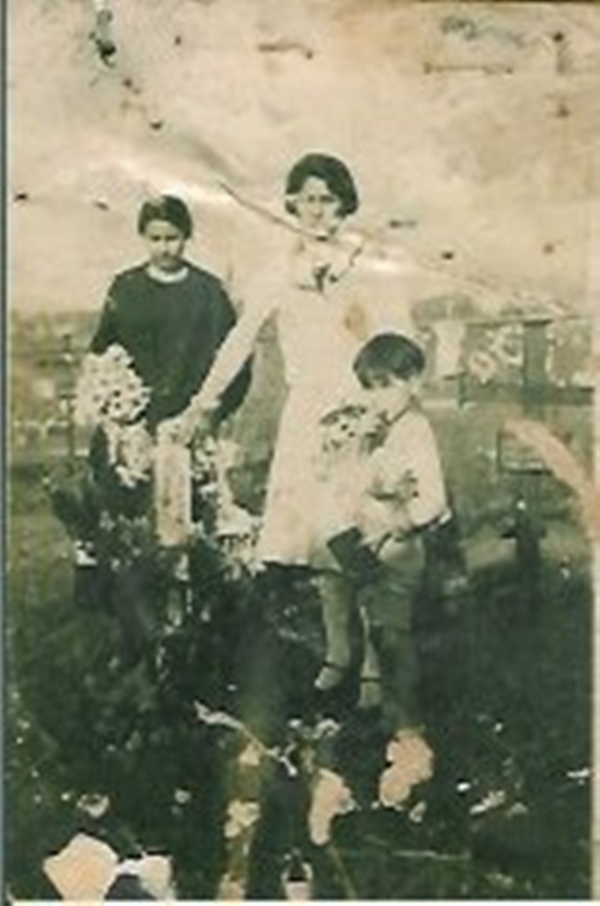
Foto de mi abuelita con mi papá cuando era un niño. La señora de atrás, era la abuelita de papá.
Mi papá a los tres años queda huérfano de padre, pues como mi abuelito estaba en contra del régimen, como casi todos los jóvenes de esa época, fue apresado y lo llevaron a trabajar a la carretera trasandina, en un lugar llamado "Palenque", con grilletes en los tobillos.
La mala alimentación, enfermedades como malaria, disentería, sarna y otras más, además del maltrato al que fue sometido, hacen que se enferme, como tantos compañeros que no lograron sobrevivir.
Un día es obligado a marchar frente a Gómez, para inaugurar la carretera, pero él se niega, porque no tiene fuerza y además no quiere humillarse frente a ese tirano que le apartó de su familia, del amor de su joven esposa y su pequeño hijo; que sin piedad le robó su vida, el pasado, el futuro y la esperanza.
El jefe de la prisión le dice que si no obedece lo mata allí mismo. Entonces, el se abre la camisa y descubriéndose el pecho, exclama:
"¡Prefiero morir antes que rendirle pleitesía a ese C... de madre de Gómez!"
Fue cuando lo matan de un tiro en el pecho. Nunca se supo que hicieron con su cadáver, como tantos presos políticos que desaparecieron en la dictadura gomecista, formando parte de ese largo silencio. Era un joven de 24 años. Esto fue narrado por un compañero preso, que logró sobrevivir después de la muerte de Gómez en 1.935, y que cumpliendo la promesa que todos se habían hecho, que el que lograra salir con vida, buscaría a sus familiares y les narraría lo que allí sucedió.
Cuando mi abuelo muere, mi papá apenas tenía dos años de edad. Tiempo después, mi abuela, quien era una mujer joven de tan solo 20 años, se vuelve a enamorar y se casa con un español como ella y viajan a España, porque la madre de su nuevo esposo estaba enferma.
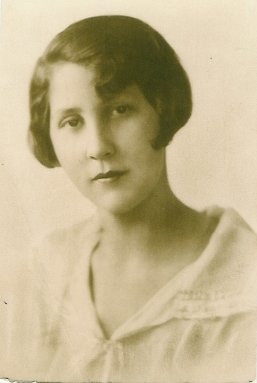
Mi abuelita.
Deja a mi padre temporalmente con sus abuelos maternos, pues no tenía dinero para el pasaje de él.
Estando en España, estalla la guerra civil en 1.936. En es ínterin, ella da a luz a una niña. El esposo de mi abuelita muere combatiendo y ella queda desamparada, sin familia, con una bebita, sin dinero. Muere en un hospital a causa de una complicación pulmonar sola, sin una mano amiga que la ayudara a bien morir, con el dolor de dejar a su hijita, y la tristeza de no poder decirle a su otro hijo, que ella no lo había abandonado.
Nunca se supo que hicieron con sus restos.
La niña quedo en manos de las monjas, como tantos niños pequeños huérfanos de Guerra.
Mi papá quien vivía con sus abuelos maternos, llamaba "papá" a su abuelo, pues fue el único padre que conoció y recibió el cariño de la abuelita. Pero un día la abuelita se marcha de la casa, porque la relación con su esposo, se hace insostenible y se va a vivir con una hija, dejando el niño al cuidado de la madre del abuelo, quien se traslada a la casa de su hijo. Ella fue muy buena con mi papá. Le enseñó a leer, a escribir y a sacar cuentas.
Un día, mi bisabuelo lleva a vivir a su casa a una mujer y su mamá decide irse de la casa, dejando a papá al cuidado de esa especie de madrastra malvada que lo maltrataba y le decía que su madre jamás lo quiso y que lo había abandonado.
Hasta estos momentos, papá jamás conoció la escuela. Lo que sabía, era porque su bisabuela se lo había enseñado. Papá solo conocía el duro trabajo, siendo tan pequeño.
Un día, el prefecto estaba en el mercado donde papá trabajaba y le ordena al abuelo que inscribiese al niño en la escuela. El abuelo lo inscribe, y lo colocan en 1° grado. Su primo cursaba el 3° grado, siendo de la misma edad para ese momento.

Mi bisabuelo.
El encuentro de los dos primos los hace muy felices.
Que diferencia la de estos dos niños de la misma edad, que eran primos hermanos, uno mimado amado, por toda la parentela, con sus padres que lo adoraban. Y el otro huérfano, en manos de una mujer que le pegaba y lo trataba como un sirviente. Al contrario del abuelo que nunca lo maltrató, pero lo ponía a trabajar con él, pues fue la vida que el conoció y le parecía normal.
En la escuela termina de aprender la escritura, la suma, resta y multiplicación. Lamentablemente dura poco, pues su abuelo lo requiere en el trabajo, para que lo ayude. Con tristeza tiene que dejar ese mundo infantil al que pertenecía por derecho.
A los 8 años de edad empieza a trabajar en el mercado a las 4am, hasta las 7am, hora en que paraba sus labores para ir a desayunar a la casa y limpiar el suelo del gallinero con las cenizas del fogón; no podía perder el tiempo, pues debía terminar rápido para llevarle el desayuno al abuelo.
Luego se quedaba trabajando, a mediodía iba almorzar y regresaba rápido; luego el abuelo se iba para la casa y allí se quedaba. Este pequeño niño a esa edad era el encargado del negocio por las tardes hasta que lo cerraba a las 6pm.
Luego se iba para la casa, comía, fregaba todos los platos y ollas usados en el día, limpiaba la cocina, recogía las cenizas de los fogones para echárselo al piso del gallinero al día siguiente. Así se limpiaba la caca de las gallinas; se bañaba y se acostaba.
Los sábados a la 1 de la madrugada, él y su abuelo caminaban mucho porque a las 3 de la madrugada, envueltos en una densa niebla, los arrieros de Galipán bajaban con sus mulas cargadas de verduras. Mi padre negociaba la mercancía que se colocaba en los sacos que le había dado su abuelo y se dirigía en mula al mercado de la Guaira que estaba a pocas cuadras, donde lo esperaba su abuelo. Contrató un pequeño camión para llevar la mercancía a Maiquetía, donde tenía un almacén con un puesto de verduras.
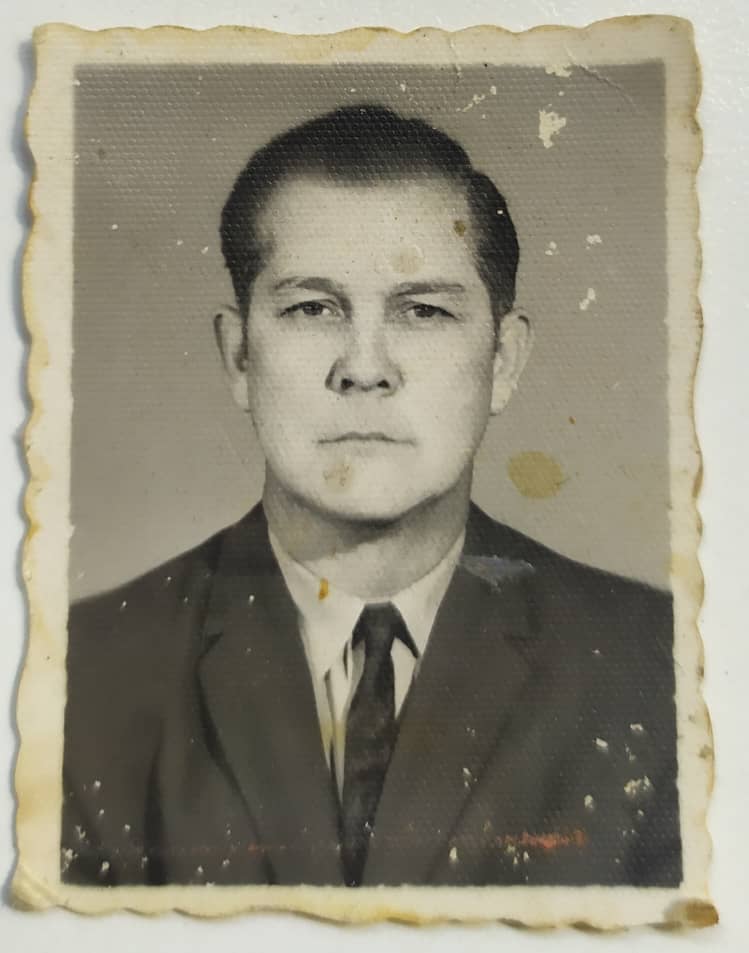
Tiempo después, el abuelo muere de tuberculosis y la pareja echa a mi papá de la casa. Se fue con su abuela, quien de inmediato, lo puso a estudiar y retoma su infancia perdida. Se hace hombre, se enamora y se casa con una mujer que era muy conflictiva. Tienen dos hijos y finalmente se divorcia.
Cuando creía que la vida era un poco cruel, conoce en una fiesta a una bonita mujer morena, de la que se enamora perdidamente. Se casan y tienen cuatro hijos. Esa mujer es mi madre y puedo con absoluta honestidad, que durante 54 años fueron inmensamente felices. Jamás los vi pelear; por el contrario, siempre estaban abrazados, tomados de la mano, haciendo planes para el futuro, viajando. Ella también tuvo una infancia difícil, con mucha pobreza, pero no como la de papá. Creo que las vivencias similares, los unió.
Tanto era el amor que se tenía, que cuando papá murió, a mamá le da un ACV y cae en cama durante tres años. De sus ojos, se había apagado el brillo y la alegría y solo esperaba pacientemente su encuentro con papá.
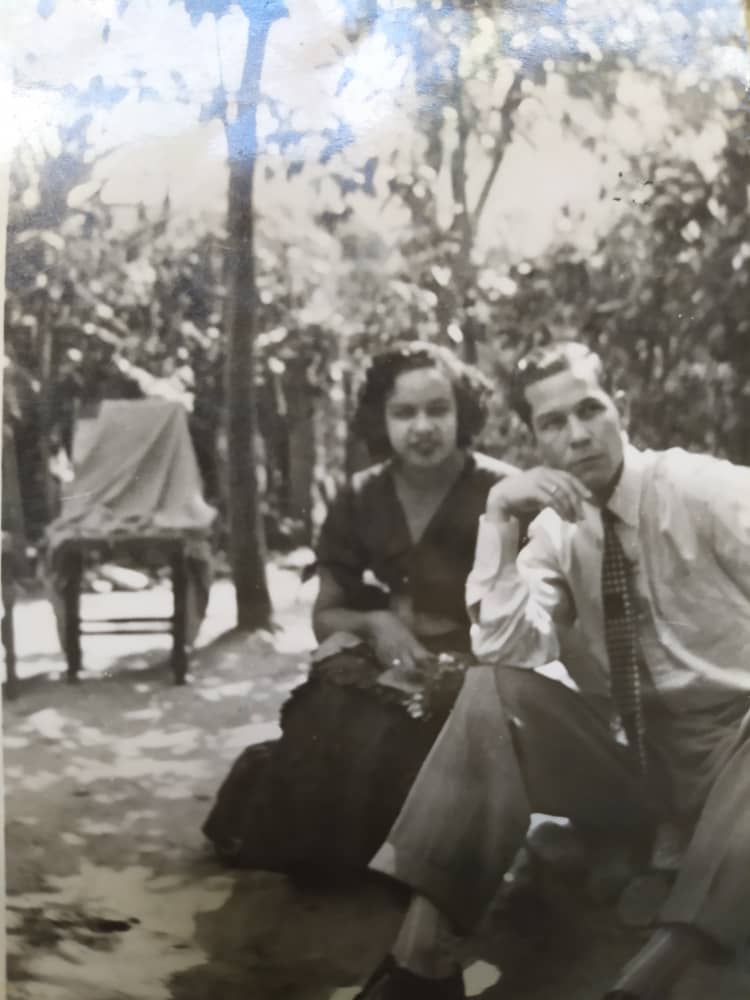 Mis padres.
Mis padres.
Por eso, si hablamos de héroes, a mi padre debo mencionar. Porque a pesar de las vicisitudes, a pesar de su horrible niñez, papá jamás cayó en el mundo de las drogas o el alcohol. Mi padre nos crió con amor, paciencia y ternura.
Tenía un sentido del humor inigualable, además de una avidez por aprender, por leer. Fue un buen odontólogo y un excelente historiador.
El fue un bello ser humano, que sobrevivió estoicamente desde niño, a todos esos obstáculos encontrados en su camino, no se detuvo.
No albergó rencores, ni resentimientos; todo lo acepto como un aprendizaje que le tocó vivir. Y eso fue lo que le trasmitió a su familia. Y al morir nos dejó ese legado de amor.
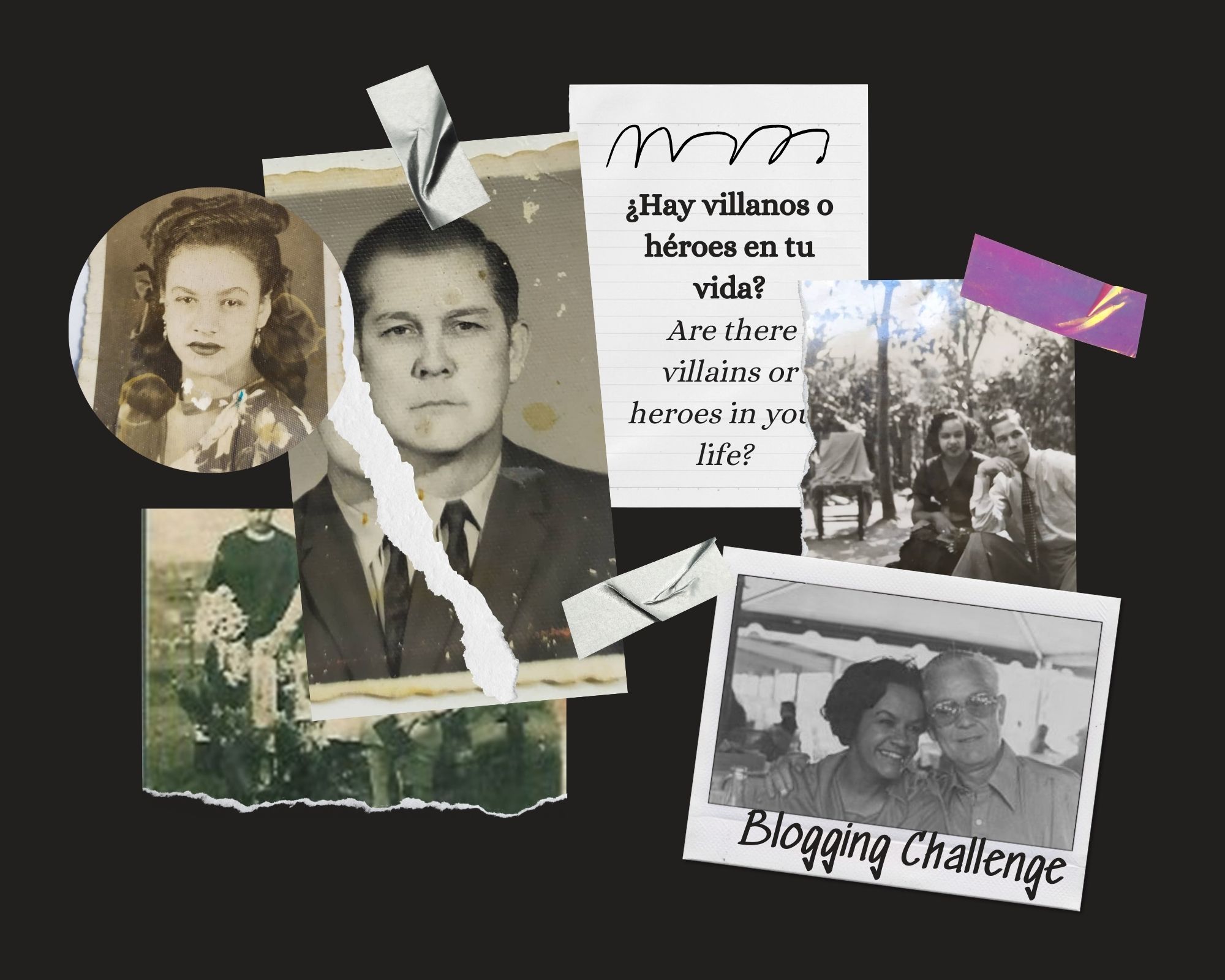
Collage made with Canva.
In English
Hello, dear readers/friends. On this second day of #bloggingchallenge, 4th part, we are talking about some hero in our lives.
Do you believe in happy endings? Continue reading this beautiful story of my favorite hero.
I know that for many people, our heroes are our parents, especially if we have had a happy childhood. This leads me to remember an extract from the song of the famous Disney movie Peter Pan, which says:
Think of your happy childhood, your childhood comes back to life!
And in your soul a song of joy you will carry
The glory will come!
You will fly, you will fly, you will fly!
For me, it has been like that. I have beautiful memories and my dad was always my hero who used to lift me up in his arms and make me spin in the air, comb my hair, which was always tangled because I never liked to comb my hair, he did it with infinite love.
As I grew up, I loved him more and more. Dad was the best.
Now that I am an adult, that I know and understand his life story, I admire and love him more than I could ever imagine.
This is the hero I am going to talk about today.
Dad had a loving mother and an equally charming father, but my grandfather belonged to the Resistance of the dictator's regime Juan Vicente Gómez

Photo of my grandmother with my father when he was a child. The lady in the back, was daddy's granny.
My father, when he was three years old, was left fatherless, because my grandfather was against the regime, like almost all young people at that time, he was arrested and taken to work on the trans-Andean road, in a place called "Palenque", with shackles on his ankles.
The poor diet, diseases such as malaria, dysentery, scabies and others, in addition to the mistreatment he was subjected to, made him sick, like so many of his comrades who did not manage to survive.
One day he is forced to march in front of Gomez, to inaugurate the road, but he refuses, because he has no strength and also does not want to humiliate himself in front of that tyrant who took him away from his family, from the love of his young wife and his little son; who mercilessly stole his life, the past, the future and hope.
The head of the prison tells him that if he does not obey he will kill him right there. Then, my grandfather opens his shirt and exposing his chest, he exclaims:
"I'd rather die than pay tribute to that damn bastard Gomez!"
That's when he was shot in the chest. It was never known what they did with her body, like so many political prisoners who disappeared during the Gomez dictatorship, forming part of that long silence. He was a young man of 24 years. This was narrated by a fellow prisoner, who managed to survive after Gómez's death in 1935, and who, fulfilling the promise that everyone had made to himself, that whoever managed to get out alive, would look for his relatives and tell them what happened there.
When my grandfather died, my father was barely two years old. Some time later, my grandmother, who was a young woman of only 20 years old, falls in love again and marries a Spaniard like her and they travel to Spain, because her new husband's mother was sick.

My granny.
She left my father temporarily with his maternal grandparents, as she had no money for his plane ticket.
While in Spain, the civil war breaks out in 1936. In the meantime, she gives birth to a baby girl. My grandmother's husband died fighting and she was left homeless, without a family, with a baby girl, without money. She dies in a hospital because of a pulmonary complication alone, without a helping hand to help her die, with the pain of leaving her little girl, and the sadness of not being able to tell her other son that she had not abandoned him.
It was never known what they did with her remains.
The girl was left in the hands of the nuns, like so many little war orphans.
My dad, who lived with his maternal grandparents, called his grandfather "dad", because he was the only father he knew and received the love of grandma. But one day the grandmother leaves the house, because the relationship with her husband, becomes untenable and she goes to live with a daughter, leaving the child in the care of the grandfather's mother, who moves to her son's house. She was very good to my dad. She taught him to read, write and do math.
One day, my great-grandfather takes a woman to live in his house and her mother decides to leave the house, leaving my father in the care of that evil stepmother who abused him and told him that his mother never loved him and had abandoned him.
Until this moment, Dad never knew about the school. What he knew was that his great-grandmother had taught him. Dad only knew about the hard work, being so young.
One day, the prefect was at the market where Dad was working and ordered Grandpa to enroll the child in school. Grandpa enrolled him, and they placed him in the first grade. His cousin was in the 3rd grade, being the same age at that time.

My great-grandfather.
The meeting of the two cousins makes them very happy.
What a difference between these two children of the same age, who were first cousins, a spoiled one loved by all the family members, and their parents who adored him. And the other orphan, in the hands of a woman who beat him and treated him like a servant. Unlike his grandfather who never mistreated him, but put him to work with him, for it was the life he knew and seemed normal to him.
In school he finishes learning writing, addition, subtraction and multiplication. Unfortunately it is short lived, as his grandfather requires him at work, to help him. Sadly he has to leave that childish world to which he rightfully belonged.
When he was 8 years old he started working in the market at 4am, until 7am, when he stopped his work to go to the house for breakfast and clean the floor of the henhouse with the ashes from the stove; he couldn't waste time, because he had to finish quickly to take breakfast to his grandfather.
Then he would stay at work, at noon he would go for lunch and return quickly; then grandpa would go home and stay there. This little boy at that age was in charge of the business in the afternoons until it closed at 6pm.
Then he would go home, eat, wash all the dishes and pots used during the day, clean the kitchen, collect the ashes from the stove and throw them on the floor of the chicken coop the next day. That's how she cleaned up the hens' poop; she bathed and went to bed.
On Saturdays at 1:00 a.m., he and his grandfather would walk a long way because at 3:00 a.m., wrapped in a dense fog, the muleteers of Galipán would come down with their mules loaded with vegetables. My dad would negotiate the merchandise that was placed in the sacks that his grandfather had given him and he would go by mule to the Guaira market that was a few blocks away, where his grandfather would wait for him. He hired a small truck to take the merchandise to Maiquetía, where he had a warehouse with a vegetable stand.

Some time later, Grandpa dies of tuberculosis and the couple kicks my dad out of the house. He left with his grandmother, who immediately put him to study and resumed his lost childhood. He becomes a man, falls in love and marries a woman who was very conflictive. They have two children and finally he gets divorced.
When he thought that life was a bit cruel, he meets a beautiful brunette at a party, with whom he falls madly in love. They get married and have four children. That woman is my mother and I can honestly say that for 54 years they were immensely happy. I never saw them fight; on the contrary, they were always hugging, holding hands, making plans for the future, traveling. She also had a difficult childhood, with much poverty, but not like Dad's. I believe that similar experiences brought them together.
So much was the love they had for each other that when Dad died, Mom got a stroke and fell into bed for three years. From her eyes, the brightness and joy had faded and she just waited patiently for her meeting with Dad.
 My parents.
My parents.
So, if we are talking about heroes, I must mention my father. Because despite the vicissitudes, despite his horrible childhood, Dad never fell into the world of drugs or alcohol. My father raised us with love, patience and tenderness.
He had an unparalleled sense of humor, as well as an eagerness to learn, to read. He was a good dentist and an excellent historian.
He was a beautiful human being, who stoically survived all those obstacles found in his way since he was a child, he did not stop.
He held no grudges, no resentments; he accepted everything as a learning experience. And that is what he passed on to his family. And when he died he left us that legacy of love.
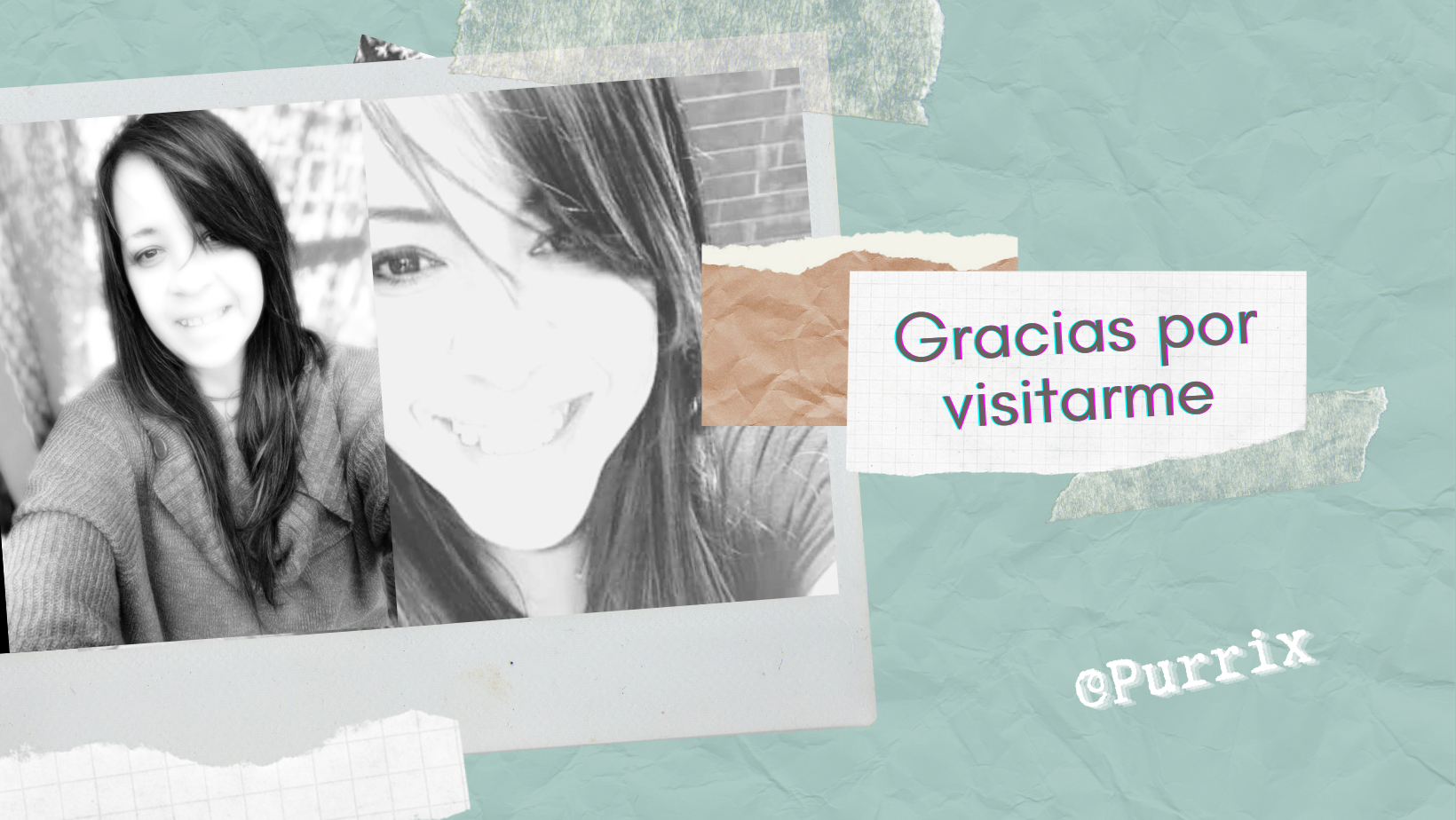
Para participar en este reto y saber cuáles serán los temas diarios, pinchen aquí
Y en las imágenes siguientes, pueden ver los temas diarios para que se animen a participar. ¿Qué esperan? ¡Está re-bueno!

To participate in this challenge and know what will be the daily issues, click here
And in the images below, you can see the daily themes to encourage you to participate. What are you waiting for? It's great!
